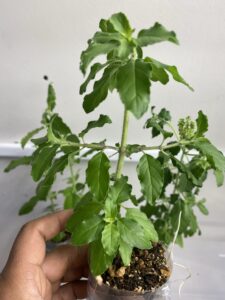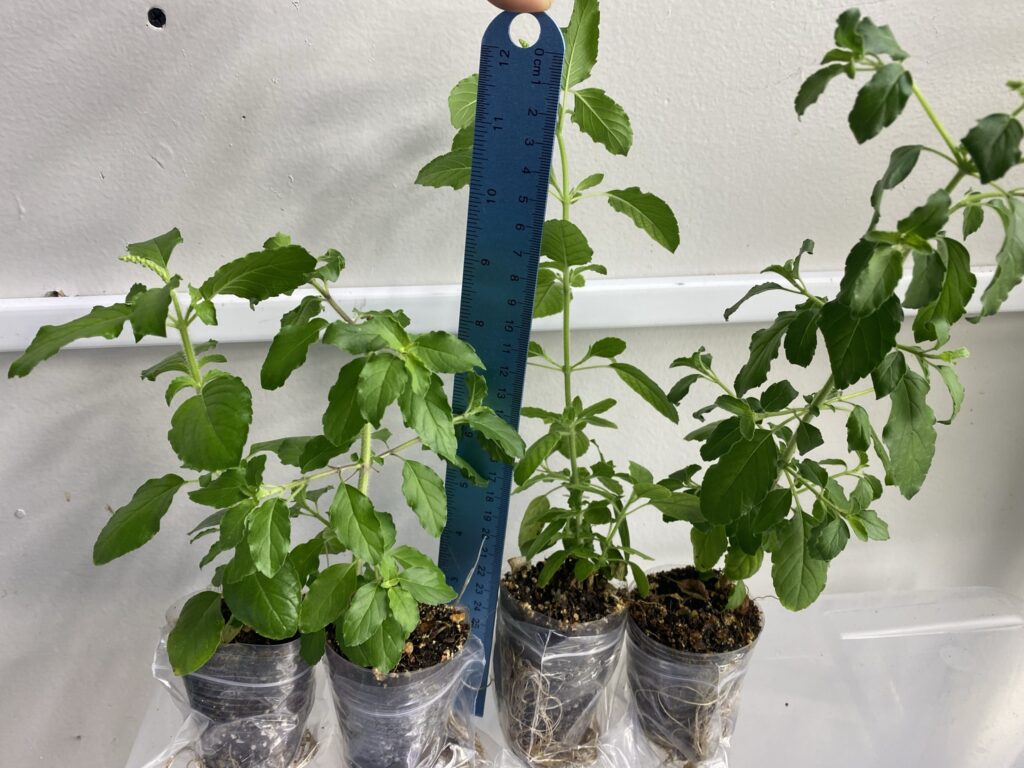If you’re curious about growing herbs at home in the UK, you’ve likely come across both tulsi (holy basil) and sweet basil And tulsi vs basil UK, . While they might seem similar at first glance, there are significant differences between them in terms of taste, appearance, medicinal properties, and growing requirements.
In this article, we’ll dive into the difference between holy basil and sweet basil, help you understand their individual benefits, and guide you on which plant might be better suited for your UK home or garden.
What is the Difference Between Holy Basil and Sweet Basil?
1. Appearance tulsi vs basil Visual Differences)
-
Holy Basil (Tulsi):
Tulsi typically has green or purplish leaves, depending on the variety. The leaves are slightly hairy with jagged edges, and the plant emits a spicy, clove-like aroma. Tulsi plants tend to look a bit wilder and less uniform compared to common culinary herbs. -
Sweet Basil:
Sweet basil has smooth, bright green leaves and a more rounded, symmetrical shape. It looks more polished and is the variety commonly seen in supermarkets and used in dishes like pesto or Caprese salads.
👉 Want to grow your own? Check out our plant shop for fresh basil plants delivered to your door.
2. Taste Profile
-
Tulsi (Holy Basil):
Tulsi has a peppery, clove-like, and slightly bitter taste. It’s considered more medicinal than culinary in Western kitchens, though it’s widely used in Ayurvedic teas and remedies. -
Sweet Basil:
Sweet basil is milder and more versatile in cooking. It has a sweet, aromatic, and slightly peppery flavour that enhances many Mediterranean and Asian dishes.
3. Medicinal Benefits
One of the most important differences between holy basil and sweet basil lies in their health benefits.
Holy Basil (Tulsi):
-
Known as the “Queen of Herbs” in Ayurveda.
-
Supports stress relief, immune health, and respiratory function.
-
Often consumed in teas or used in natural supplements.
-
Contains adaptogens that help the body manage stress.
Sweet Basil:
-
Rich in antioxidants like eugenol.
-
Supports anti-inflammatory and antibacterial properties.
-
Aids digestion and may help regulate blood sugar levels.
If you’re looking for herbs with powerful wellness benefits, tulsi is the superior choice.
Traditional vs Culinary Usage
🌿 Tulsi (Holy Basil) in Tradition
-
Considered sacred in Hindu culture.
-
Commonly planted near homes or temples in India.
-
Used in herbal teas, tonics, and natural remedies.
-
Tulsi leaves are often chewed raw or steeped in boiling water.

🌿 Sweet Basil in Culinary Dishes
-
A staple herb in Italian, Thai, and Mediterranean cuisine.
-
Perfect for dishes like:
-
Pesto
-
Tomato sauces
-
Salads
-
Thai curries and stir-fries
-
-
Best used fresh for maximum flavour.
In the UK kitchen, sweet basil is a versatile and beginner-friendly herb. But tulsi offers cultural depth and holistic health benefits that are growing in popularity.
Which One Should You Grow in the UK?
Both tulsi and sweet basil can be grown in the UK, but they have different needs and benefits.
✅ Sweet Basil: Best for UK Kitchens
-
Thrives indoors on sunny windowsills or in greenhouses.
-
Grows well from spring through summer.
-
Requires warm, sheltered environments.
-
A great herb for everyday cooking.
✅ Tulsi: Best for Health-Conscious Homes
-
Can be grown indoors or outdoors in the UK during summer.
-
Needs warmth, humidity, and full sun.
-
Suitable for UK homes with south-facing windows or greenhouses.
-
Great for herbal tea lovers and those interested in wellness.
Can You Grow Both in the UK?
Absolutely! Many UK gardeners successfully grow both tulsi and sweet basil at home, especially indoors or in greenhouses. If you’re looking to enhance both your meals and your health, having both plants in your garden or windowsill gives you the best of both worlds.
🌱 Shop Now:
Explore our wide collection of fresh basil plants and herbs at Plants Paradise Shop. We offer healthy, UK-grown plants with home delivery available.
Final Thoughts: Tulsi vs Basil UK
So, tulsi vs basil UK – which one should you choose?
-
Choose tulsi (holy basil) if:
-
You’re into herbal teas and natural remedies.
-
You value spiritual or Ayurvedic traditions.
-
You want to grow a sacred, medicinal herb indoors.
-
-
Choose sweet basil if:
-
You love cooking Italian or Thai dishes.
-
You want a low-maintenance, fast-growing kitchen herb.
-
You’re new to growing herbs in the UK.
-
For the ultimate herb garden, why not try both?
Summary Table: Tulsi vs Sweet Basil
| Feature | Tulsi (Holy Basil) | Sweet Basil |
|---|---|---|
| Appearance | Hairy, jagged, green/purple leaves | Smooth, rounded, bright green |
| Taste | Peppery, clove-like, slightly bitter | Sweet, fresh, aromatic |
| Use | Herbal tea, medicine | Cooking, sauces, salads |
| Medicinal Value | High (Adaptogenic, Immune-boosting) | Moderate (Anti-inflammatory) |
| Growing Conditions | Warm, humid, full sun (indoors in UK) | Warm, sunny (windowsill-friendly) |
| Popular in | Ayurveda, Indian homes | Mediterranean & Asian cuisine |
| Available at | Plants Paradise Shop | Plants Paradise Shop |
🌿 Ready to Start Growing?
Whether you’re a culinary enthusiast or a wellness lover, we have the right plants for your UK home. Browse our full collection of basil varieties and herb plants at Plants Paradise UK Shop.
Follow us: Facebook


